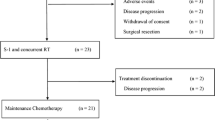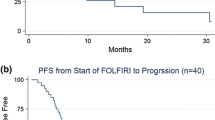Abstract:
It is well known that the clinical course in most patients with advanced pancreatic cancer is not influenced substantially by chemotherapy and/or radiotherapy. However, new chemotherapy, based on the synergistic antitumor activities of 5-fluorouracil (5-FU) and cisplatin (CDDP) producing biochemical modulation in solid cancers diagnosed as adenocarcinoma, has recently been reported to be effective. In gastrointestinal cancers, the optimal concentrations of each drug and the duration of the anticancer effects, as well as adverse effects have been confirmed in pharmacodynamic studies. Our experience of this treatment for advanced pancreatic cancer (stage IV) indicates the usefulness of the antitumor effect in terms of both effect on the tumor size in unresectable patients and prognosis in resectable patients. These results were remarkable in patients diagnosed as stage IV b and/or curability C. Although there were adverse effects, none were severe. However, anything compromising the patient's quality of life must be prevented. Randomized prospective studies of the combination of 5-FU and CDDP are expected in the near future.
Similar content being viewed by others
Author information
Authors and Affiliations
Additional information
Received for publication on July 29, 1998; accepted on July 31, 1998
About this article
Cite this article
Hirata, K., Mukaiya, M., Yamamitsu, S. et al. Biochemical modulation therapy for pancreatic cancer. J Hep Bil Pancr Surg 5, 255–260 (1998). https://doi.org/10.1007/s005340050043
Issue Date:
DOI: https://doi.org/10.1007/s005340050043




